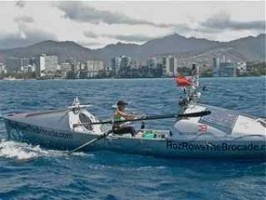I felt I had to respond to John Kay’s comment on last Philosophy Friday’s blog. Maybe he voiced what other people were thinking. Or maybe not. Anyway, it raises a couple of interesting points.
He says: “No, we don’t need economic growth, but without it we wouldn’t have ipods or cell phones, or any sort of phone for that matter. No computers, either. It’s economic growth that gives us the leisure to follow you on your adventures and allows you to go on those adventures.”
John, with all due respect, I am afraid I have to disagree with you. Our techno-toys may well be the product of the old growth-driven economic model, but that does not mean to say that no growth = no innovation in the future. I am no economist, I confess, so maybe I am missing something here, but I see no reason why companies cannot be driven to do things better rather than do things bigger. Stability does not have to mean stagnation.
To hear from somebody who knows better than I what they are talking about, I would highly recommend Tim Jackson’s inspiring and convincing lecture on “Prosperity without Growth “. John goes on to say: “We (at least some of us) know what the problem is. What we don’t know is what solution would work, how to implement it, how soon we could tell whether it actually works and what to do if it fails and makes matters worse.
“Sorry to seem pessimistic, but it’s hard to find any example of a major change implemented successfully without causing other problems – the Mongol invasion of Western Europe, French Revolution, China’s “Great Leap Forward”, Hitler’s solution, India/Pakistan partition, European Union….
“I’m always on your side, Roz; just trying to be realistic. Arousing people’s interest in the problem – as you do so well – is a good start but leaves us frustrated about what we can actually do apart from demanding that someone else does something.”
Again, I’m going to refer to minds superior to my own, with these two quotes:
“Let people accomplish your objective their way.” (Clark Johnson)
“I wanted to change the world. But I have found that the only thing one can be sure of changing is oneself.” (Aldous Huxley)
I agree with you, John, that demanding that somebody else do something rarely succeeds. I was in Copenhagen for COP15, and came away with grave doubts that the tough decisions we need will be made by democratically elected leaders.
My philosophy is very much that we each have to live consciously and responsibly, and spread ripples of change by encouraging (but not telling) other people what we are doing and why.
I have a firm policy of not telling people what to do. I may say what I would do, or ask them to do something, but I have enough difficulty running my own life without trying to run other people’s as well.
But if I were in your shoes, John, I would be very grateful to be living on a nice-sized plot of land with a few helpful relatives on hand. I would figure out how I can be as self-sufficient as possible – in energy and food – and put my land to good use. And I would tell people about what I am doing, knowing that although I can’t personally change what people in China or India or Brazil are doing, everything I do has the potential to spread ripples of change.
You can’t go wrong with this course of action. It can’t make matters worse. It may well make them better. If the worst comes to the worst, you and your family will be insulated from the worst effects. And if nothing else. it will keep you so busy you won’t have time to be frustrated about the state of the world.
Other Stuff:
This blog is plenty long enough already. but a few quick hellos, and a reminder that our latest podcast episode, “Farmer in the Waves” is now live at the Roz Roams website. Oh, and an update on the rowing: still rough and splashy-bashy rowing across the waves, making slow progress.
Tom – great question on free will. To be pondered and cogitated upon!
Karen Morss – congrats on deciding to go solar! Makes great sense for you in Emerald Hills. I am enjoying a jar of your plum jam at the moment. Goes great with my cashew-and-cranberry rawfood crackers!
Shana – so sorry, didn’t mean to be rude about your iPod comment! But penance in form of sponsored miles very much appreciated – thank you. I am trying to find a way that I can post some info about progress without giving too much away. I’ll keep you posted.
Rich Raistrick – Nicola mentioned your trip to the Azores. I sailed there from Cape Verde in 2005. Gorgeous! How are the hens doing?
Inky – so sorry to hear about your mother’s passing. She sounds like a very special lady, brave and resilient. I will be honoured to row the miles sponsored in her name.
Thanks for the IDs on the mahi-mahi, Bob and Jean Francois!
And finally, the quote for the day: “Any activity becomes creative when the doer cares about doing it right, or doing it better.” (John Updike)
Photo: spreading ripples – arriving in Waikiki, 2008
Sponsored Miles: Thanks to Doug Grandt for more miles sponsored.

